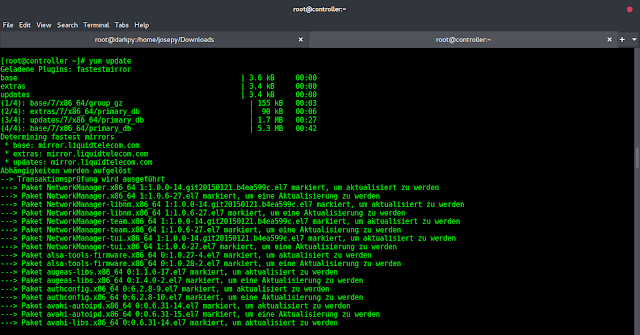Given an array of integers, arr[] of size N, the task is to print all possible sum at each valid index, that can be obtained by adding i + a[i]th (1-based indexing) subsequent elements till i ? N.
Examples:
Input: arr[] = {4, 1, 4}
Output: 4 5 4
Explanation:
For i = 1, arr[1] = 4.
For i = 2, arr[2] = arr[2] + arr[2 + arr[2]] = arr[2] + arr[2 + 1] = arr[2] + arr[3] = 1 + 4 = 5.
For i = 3, arr[3] = 4.Input: arr[] = {1, 2, 7, 1, 8}
Output: 12 11 7 9 8
Explanation:
For i = 1, arr[1] = arr[1] + arr[1 + 1] + arr[1 + 1 + 2] + arr[1 + 1 + 2 + 1] = arr[1] + arr[2] + arr[4] + arr[5] = 1 + 2 + 1 + 8 = 12.
For i = 2, arr[2] = arr[2] + arr[2 + 2] + arr[2 + 2 + 1] = 2 + 1 + 8 = 11.
For i = 3, arr[3] = 7.
For i = 4,arr[4] = arr[4] + arr[4 + 1] = 1 + 8 = 9.
For i = 5, the sum will be arr[5] = 8.
Naive Approach: The simplest approach is to traverse the array and for every ith index, keep updating arr[i] to arr[i + arr[i]] while i ? N and print the sum at that index.
Time Complexity: O(N2)
Auxiliary Space: O(N)
Efficient Approach: The above approach can be optimized by traversing the array in reverse and store the sum for every visited index to the current index. Finally, print the array.
Below is the implementation of the above approach:
C++
// C++ program for the above approach#include <bits/stdc++.h>using namespace std;// Function to maximize value// at every array index by// performing given operationsint maxSum(int arr[], int N){ int ans = 0; // Traverse the array in reverse for (int i = N - 1; i >= 0; i--) { int t = i; // If the current index // is a valid index if (t + arr[i] < N) { arr[i] += arr[t + arr[i]]; } } // Print the array for (int i = 0; i < N; i++) { cout << arr[i] << ' '; }}// Driver Codeint main(){ // Given array int arr[] = { 1, 2, 7, 1, 8 }; // Size of the array int N = sizeof(arr) / sizeof(arr[0]); maxSum(arr, N); return 0;} |
Java
// Java program for the above approachimport java.io.*;class GFG{// Function to maximize value// at every array index by// performing given operationsstatic void maxSum(int[] arr, int N) { int ans = 0; // Traverse the array in reverse for(int i = N - 1; i >= 0; i--) { int t = i; // If the current index // is a valid index if (t + arr[i] < N) { arr[i] += arr[t + arr[i]]; } } // Print the array for(int i = 0; i < N; i++) { System.out.print(arr[i] + " "); }}// Driver Codepublic static void main(String[] args){ // Given array int[] arr = { 1, 2, 7, 1, 8 }; // Size of the array int N = arr.length; maxSum(arr, N);}}// This code is contributed by Dharanendra L V |
Python3
# Python program for the above approach# Function to maximize value# at every array index by# performing given operationsdef maxSum(arr, N): ans = 0; # Traverse the array in reverse for i in range(N - 1, -1, -1): t = i; # If the current index # is a valid index if (t + arr[i] < N): arr[i] += arr[t + arr[i]]; # Print array for i in range(N): print(arr[i], end = " ");# Driver Codeif __name__ == '__main__': # Given array arr = [1, 2, 7, 1, 8]; # Size of the array N = len(arr); maxSum(arr, N);# This code is contributed by 29AjayKumar |
C#
// C# program for the above approachusing System;class GFG {// Function to maximize value// at every array index by// performing given operationsstatic void maxSum(int[] arr, int N){ // Traverse the array in reverse for(int i = N - 1; i >= 0; i--) { int t = i; // If the current index // is a valid index if (t + arr[i] < N) { arr[i] += arr[t + arr[i]]; } } // Print the array for(int i = 0; i < N; i++) { Console.Write(arr[i] + " "); }}// Driver Codestatic public void Main() { // Given array int[] arr = { 1, 2, 7, 1, 8 }; // Size of the array int N = arr.Length; maxSum(arr, N);}}// This code is contributed by Dharanendra L V |
Javascript
<script>// JavaScript program for // the above approach // Function to maximize value// at every array index by// performing given operationsfunction maxSum(arr, N){ let ans = 0; // Traverse the array in reverse for (let i = N - 1; i >= 0; i--) { let t = i; // If the current index // is a valid index if (t + arr[i] < N) { arr[i] += arr[t + arr[i]]; } } // Print the array for (let i = 0; i < N; i++) { document.write(arr[i] + ' '); }} // Driver Code // Given array let arr = [ 1, 2, 7, 1, 8 ]; // Size of the array let N = arr.length; maxSum(arr, N); </script> |
12 11 7 9 8
Time Complexity: O(N)
Auxiliary Space: O(1)
Ready to dive in? Explore our Free Demo Content and join our DSA course, trusted by over 100,000 neveropen!




